Warning: Trying to access array offset on value of type bool in /www/wwwroot/www.medtourcn.com/wp-content/themes/medical-directory/framework/theme/medicaldirectory-image.php on line 78
Warning: Trying to access array offset on value of type bool in /www/wwwroot/www.medtourcn.com/wp-content/themes/medical-directory/framework/theme/medicaldirectory-image.php on line 79

How to Choose Among Similar CAR-T Therapies?
**How to Choose Among Similar CAR-T Therapies?**
Currently, there are multiple CAR-T products targeting the same antigen available on the market, which can make it difficult for patients to decide which one to choose.
Experts recommend selecting a therapy based on the treatment target. It is generally advisable to prioritize approved products, as they have been validated, providing better assurance of safety and efficacy. For example, CD19-targeting CAR-T products are typically preferred over CD22-targeting ones, and BCMA-targeting therapies are favored over GPRC5D-targeting ones.
Additionally, it’s important to consider the origin of the CAR-T cells (such as human-derived vs. mouse-derived) and the costimulatory signals used (e.g., 4-1BB vs. CD28). Different conditions may also influence the choice; for instance, lymphoma patients may be more suitable for CD28, while those with acute leukemia might benefit more from 4-1BB.
In the end, patients are advised to make an informed decision based on their medical history and the guidance of their doctors.

 To assess whether the condition is suitable for CAR-T therapy, you can submit pathology reports, treatment history, and discharge summaries to the Medical Department of Advanced Medicine in China for preliminary evaluation!
To assess whether the condition is suitable for CAR-T therapy, you can submit pathology reports, treatment history, and discharge summaries to the Medical Department of Advanced Medicine in China for preliminary evaluation!
WhatsApp: Https://wa.me/+8613717959070
Email: doctor.huang@globecancer.com
Warning: Trying to access array offset on value of type bool in /www/wwwroot/www.medtourcn.com/wp-content/themes/medical-directory/framework/theme/medicaldirectory-image.php on line 78
Warning: Trying to access array offset on value of type bool in /www/wwwroot/www.medtourcn.com/wp-content/themes/medical-directory/framework/theme/medicaldirectory-image.php on line 79

At which stage of treatment is the best time to choose CAR-T therapy?
At which stage of treatment is the best time to choose CAR-T therapy?
CAR-T therapy is often used as a last resort, but it should be introduced earlier for better outcomes. Early use, even as a frontline or 1.5-line treatment, could dramatically increase patient cure rates.
Tumor cells are highly adaptable and intelligent, learning to evade treatments over time. Treating tumors early, before they become stronger, is crucial.
CAR-T should not be considered a “last resort” in treatment, as waiting too long may reduce its effectiveness. It’s better to “kill the tumor when it’s young” before it becomes more resilient and difficult to eliminate.

 To assess whether the condition is suitable for CAR-T therapy, you can submit pathology reports, treatment history, and discharge summaries to the Medical Department of Advanced Medicine in China for preliminary evaluation!
To assess whether the condition is suitable for CAR-T therapy, you can submit pathology reports, treatment history, and discharge summaries to the Medical Department of Advanced Medicine in China for preliminary evaluation!
WhatsApp: Https://wa.me/+8613717959070
Email: doctor.huang@globecancer.com
Warning: Trying to access array offset on value of type bool in /www/wwwroot/www.medtourcn.com/wp-content/themes/medical-directory/framework/theme/medicaldirectory-image.php on line 78
Warning: Trying to access array offset on value of type bool in /www/wwwroot/www.medtourcn.com/wp-content/themes/medical-directory/framework/theme/medicaldirectory-image.php on line 79
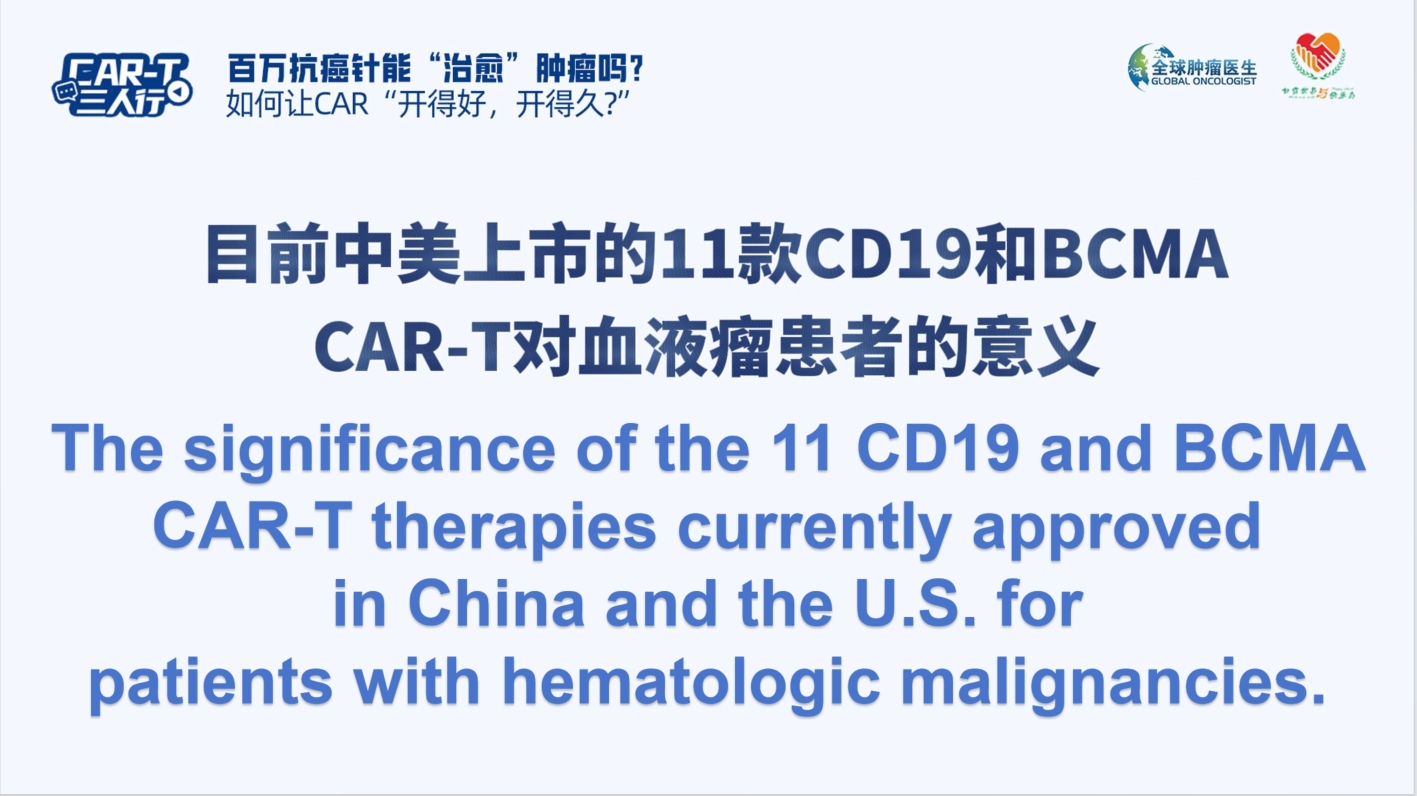
The significance of the 11 CD19 and BCMA CAR-T therapies currently approvedin China and the U.S. forpatients with hematologic malignancies.
The significance of the 11 CD19 and BCMA CAR-T therapies currently approvedin China and the U.S. forpatients with hematologic malignancies.
目前中美上市的11款CD19和BCMA CAR-T对血液瘤患者的意义
Expert:
**Jing Pan**
**Associate Chief Physician**
**Department of Pediatric Hematology, Beijing Gaobo Hospital**
**Professional Memberships:**
– Member, Pediatric Oncology Professional Committee of the Chinese Anti-Cancer Association
– Youth Committee Member, Hematologic Oncology Professional Committee of the Chinese Anti-Cancer Association
– Youth Committee Member, Clinical Application Professional Committee of the Chinese Medical Biotechnology Association
**Expertise:**
Dr. Pan currently manages an 80-bed pediatric hematology unit and has extensive experience in pediatric hematology, particularly in CAR-T cell immunotherapy, with nearly 10 years of experience in the field. She is dedicated to stratified CAR-T treatment, optimizing the management of complications during CAR-T therapy, and establishing an efficacy monitoring system post-treatment. Dr. Pan and her team have accumulated one of the largest single-center case collections globally, particularly in the areas of sequential CAR-T therapy for improving long-term outcomes in B-ALL and in exploring autologous and allogeneic CD5, CD7 CAR-T therapy for T-ALL/LBL.
Her related clinical research on CD7 CAR-T, CD19 CAR-T, CD22 CAR-T, and CD19-22 sequential CAR-T has been published in leading international journals such as *Lancet Oncology*, *JCO*, *Blood*, *JHO*, and *Leukemia*. Additionally, she has frequently presented the latest advancements in her team’s immunotherapy research at both domestic and international conferences, including ASCO, ASH, EHA, and JSH.
潘 静
副主任医师
北京高博医院 小儿血液科
中国抗癌协会小儿肿瘤专业委员会专业委员
中国抗癌协会血液肿瘤专业委员会青年委员
中国医药生物技术协会医药生物技术临床应用专业委员会青年委员
擅长:
目前独立管理床位数80张的儿童血液病区。从事儿童血液科临床工作多年,特别是在儿童CAR-T细胞免疫治疗方面积累了近10年的经验。致力于CAR-T的分层治疗,优化CAR-T治疗过程中的并发症处理,建立CAR-T治疗后的疗效监控体系。尤其是其带领团队在序贯CAR-T提高B-ALL远期预后,T-ALL/LBL的自体、异体CD5、CD7CAR-T治疗探索方面目前积累了全球较大的单中心病例数。相关的CD7CAR-T临床研究、CD19CAR-T临床研究、CD22CAR-T临床研究、CD19-22序贯CAR-T研究等,发表在国际血液病权威杂志期刊Lancet on-cology、JC0、Blood、JHO和Leukemia。并多次在国内外学术会议(美国临床肿瘤大会ASCO、美国血液年会ASH、欧洲血液年会EHA、日本血液年会JSH)汇报团队免疫治疗的最新进展。

 To assess whether the condition is suitable for clinic therapy, you can submit Advanced Medicine in China for preliminary evaluation!
To assess whether the condition is suitable for clinic therapy, you can submit Advanced Medicine in China for preliminary evaluation!
WhatsApp: +8613717959070
Https://wa.me/+8613717959070
Email: doctor.huang@globecancer.com
#cart #carttherapy #CAR_T #leukemia #lymphoma #cancer #tumor #bloodcancer
Warning: Trying to access array offset on value of type bool in /www/wwwroot/www.medtourcn.com/wp-content/themes/medical-directory/framework/theme/medicaldirectory-image.php on line 78
Warning: Trying to access array offset on value of type bool in /www/wwwroot/www.medtourcn.com/wp-content/themes/medical-directory/framework/theme/medicaldirectory-image.php on line 79

Can the Million-dollar Anti-cancer Injection “Cure” Tumors?
Can the Million-dollar Anti-cancer Injection “Cure” Tumors?
Is CAR-T therapy really a “one-shot cure”?
And how can we ensure that this CAR “drives well and drives long”?
百万抗癌针能“治愈”肿瘤吗?
如何让CAR“开得好,开得久?”
Expert:
**Jing Pan**
**Associate Chief Physician**
**Department of Pediatric Hematology, Beijing Gaobo Hospital**
**Professional Memberships:**
– Member, Pediatric Oncology Professional Committee of the Chinese Anti-Cancer Association
– Youth Committee Member, Hematologic Oncology Professional Committee of the Chinese Anti-Cancer Association
– Youth Committee Member, Clinical Application Professional Committee of the Chinese Medical Biotechnology Association
**Expertise:**
Dr. Pan currently manages an 80-bed pediatric hematology unit and has extensive experience in pediatric hematology, particularly in CAR-T cell immunotherapy, with nearly 10 years of experience in the field. She is dedicated to stratified CAR-T treatment, optimizing the management of complications during CAR-T therapy, and establishing an efficacy monitoring system post-treatment. Dr. Pan and her team have accumulated one of the largest single-center case collections globally, particularly in the areas of sequential CAR-T therapy for improving long-term outcomes in B-ALL and in exploring autologous and allogeneic CD5, CD7 CAR-T therapy for T-ALL/LBL.
Her related clinical research on CD7 CAR-T, CD19 CAR-T, CD22 CAR-T, and CD19-22 sequential CAR-T has been published in leading international journals such as *Lancet Oncology*, *JCO*, *Blood*, *JHO*, and *Leukemia*. Additionally, she has frequently presented the latest advancements in her team’s immunotherapy research at both domestic and international conferences, including ASCO, ASH, EHA, and JSH.
潘 静
副主任医师
北京高博医院 小儿血液科
中国抗癌协会小儿肿瘤专业委员会专业委员
中国抗癌协会血液肿瘤专业委员会青年委员
中国医药生物技术协会医药生物技术临床应用专业委员会青年委员
擅长:
目前独立管理床位数80张的儿童血液病区。从事儿童血液科临床工作多年,特别是在儿童CAR-T细胞免疫治疗方面积累了近10年的经验。致力于CAR-T的分层治疗,优化CAR-T治疗过程中的并发症处理,建立CAR-T治疗后的疗效监控体系。尤其是其带领团队在序贯CAR-T提高B-ALL远期预后,T-ALL/LBL的自体、异体CD5、CD7CAR-T治疗探索方面目前积累了全球较大的单中心病例数。相关的CD7CAR-T临床研究、CD19CAR-T临床研究、CD22CAR-T临床研究、CD19-22序贯CAR-T研究等,发表在国际血液病权威杂志期刊Lancet on-cology、JC0、Blood、JHO和Leukemia。并多次在国内外学术会议(美国临床肿瘤大会ASCO、美国血液年会ASH、欧洲血液年会EHA、日本血液年会JSH)汇报团队免疫治疗的最新进展。

 To assess whether the condition is suitable for clinic therapy, you can submit Advanced Medicine in China for preliminary evaluation!
To assess whether the condition is suitable for clinic therapy, you can submit Advanced Medicine in China for preliminary evaluation!
WhatsApp: +8613717959070
Email: doctor.huang@globecancer.com
Warning: Trying to access array offset on value of type bool in /www/wwwroot/www.medtourcn.com/wp-content/themes/medical-directory/framework/theme/medicaldirectory-image.php on line 78
Warning: Trying to access array offset on value of type bool in /www/wwwroot/www.medtourcn.com/wp-content/themes/medical-directory/framework/theme/medicaldirectory-image.php on line 79
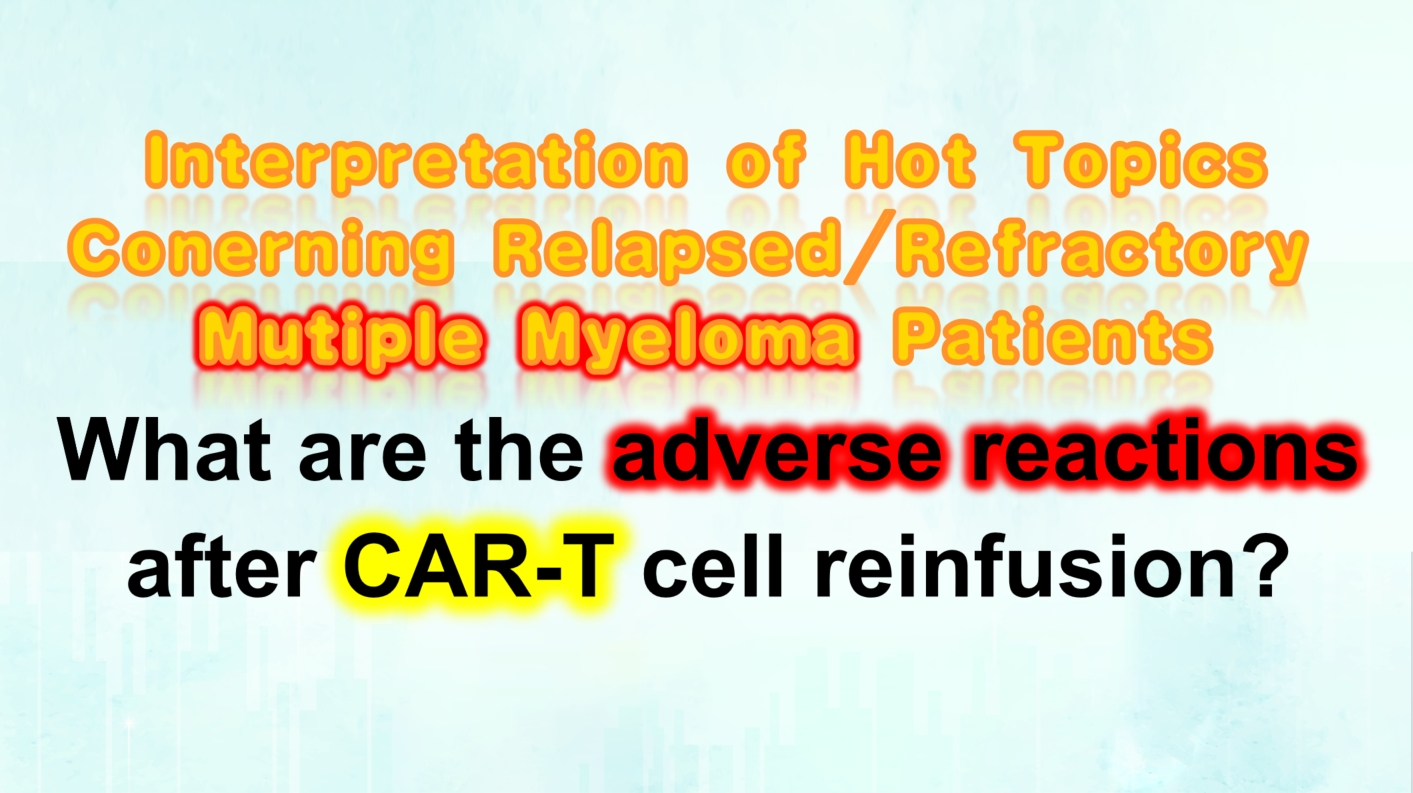
What are the adverse reactions after CAR-T cell reinfusion?
 Interpretation of Hot Topics Conerning Mutiple Myeloma Patients:
Interpretation of Hot Topics Conerning Mutiple Myeloma Patients:
 “What are the adverse reactions after CAR-T cell reinfusion?”
“What are the adverse reactions after CAR-T cell reinfusion?”
Process Diagram for Myeloma Patients Receiving CAR-T Therapy
RRMM(Relapsed/Refractory Multiple Myeloma)
Unveiling how the “million-dollar anti-cancer shot” saves patients with recurrent and refractory bone tumors! Taking you through the entire process of CAR-T therapy.
 CAR-T细胞回输后有哪些不良反应?
CAR-T细胞回输后有哪些不良反应?
骨髓瘤患者接受CAR-T治疗的流程图
权威专家解读之骨髓瘤全程管理
Expert Introduction
Chief Phsician Professor Doctoral Supervisor
Peking University People’s Hospital,
Peking University Institute of Hematology
Director-General and Standing Committee of Hematolog Branch of Chinese Phsicians Association
Memer of the International Meloma oring Group Asia-Pacific Meloma oring Group
Associate Leader Plasma Ctolog Group Hematolog Branch Chinese Medical Association
Memer of the China and International Collaorative Group on Primar Sstemic Amloidosis
President of Hematologists Branch of Beiing Phsicians Association
Memer of International Research Group on Renal and Monoclonal lmmunogloulinopathies
Vice President of Hematolog Branch of Chinese Geriatrics Association and Chairman of Academic Commitee on Muliple Meloma
Associate Leader Multiple Meloma and Related Diseases Group Hematolog Committee Chinese Association of Female Phsicians

 To assess whether the condition is suitable for CAR-T or clinic therapy, you can submit Advanced Medicine in China for preliminary evaluation!
To assess whether the condition is suitable for CAR-T or clinic therapy, you can submit Advanced Medicine in China for preliminary evaluation!
WhatsApp: +8613717959070
Email: doctor.huang@globecancer.com
#CART #Mutiplemyeloma #carttherapy #myeloma #leukemia #drug #RRMM #cancer #cancertreatment #tcell #cell #advancedmedical #AdvancedMedicineinChina
Warning: Trying to access array offset on value of type bool in /www/wwwroot/www.medtourcn.com/wp-content/themes/medical-directory/framework/theme/medicaldirectory-image.php on line 78
Warning: Trying to access array offset on value of type bool in /www/wwwroot/www.medtourcn.com/wp-content/themes/medical-directory/framework/theme/medicaldirectory-image.php on line 79
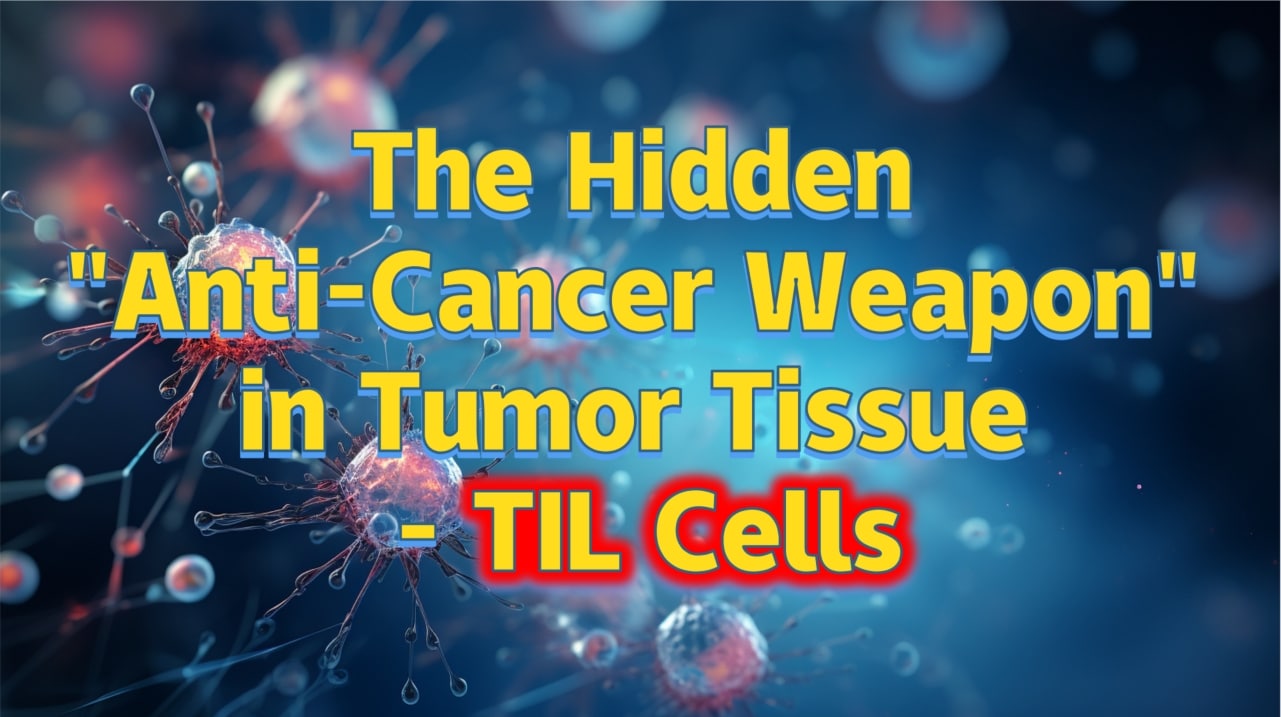
The Hidden “Anti-Cancer Weapon” in Tumor Tissue – TIL Cells
### The Hidden “Anti-Cancer Weapon” in Tumor Tissue – TIL Cells

TIL Therapy
**TIL Cells: Turning Tumor Tissue “Waste” into Treasure**
Lymphocytes are a crucial part of the immune system. They can be found both in the periphery and within tumor tissues, serving as the body’s natural defense against tumor cells. Traditionally, only a small portion of excised tumor tissue is used for pathological diagnosis, while the majority is discarded as medical waste. This practice wastes the valuable anti-cancer resources hidden within the patient’s own body!
Tumor-Infiltrating Lymphocyte (TIL) therapy involves extracting lymphocytes from the tumor biopsy tissue of cancer patients. Using DNA sequencing technology, these lymphocytes surrounding the tumor cells are collected, expanded, and cultured in vitro before being reinfused into the patient. TIL therapy has shown positive clinical outcomes in various solid tumors, such as non-small cell lung cancer, melanoma, colorectal cancer, ovarian cancer, cervical cancer, and head and neck cancers. Compared to other T-cell therapies like CAR-T and TCR-T, TIL therapy offers broader targeting, more precise recognition, and more enduring anti-cancer effects.
**Applications of TIL Cells**
1. **For Early-Stage Cancer Patients:** TIL cells can be used as adjuvant therapy after surgery, helping to eliminate residual cancer cells following traditional treatments like surgery, radiotherapy, and chemotherapy, thereby preventing tumor recurrence or metastasis.
2. **For Advanced Cancer Patients:** TIL cells can serve as a last-line salvage treatment, aiding in extending survival time, improving quality of life, and addressing the dilemma of “no available drugs” for late-stage cancer patients.
**The Relationship Between TIL Cells and Cancer Patient Prognosis**
Using “non-small cell lung cancer” (#NSCLC) as an example, we can explore the impact of peripheral and tumor-infiltrating lymphocytes (TIL cells) on the prognosis of cancer patients.
A hospital in Tianjin, China, collected peripheral blood and tumor tissue samples from 105 newly diagnosed and untreated stage III/IV NSCLC patients. They analyzed the overall composition of peripheral blood cells and TIL cells, calculating and analyzing the overall survival (OS) of all patients. The results were as follows:
1. The median overall survival (mOS) for all patients was 12 months. The 1-year, 2-year, and 3-year overall survival (OS) rates were 60.5%, 28.4%, and 18.6%, respectively.
2. Patient OS was related to tumor size, tumor pathology, and CRP levels.
– **Tumor Size:** Patients with tumor lesions smaller than 4.8 cm had significantly longer OS compared to those with lesions larger than 4.8 cm (p=0.040).
– **Tumor Pathology:** Patients with squamous cell carcinoma had significantly longer OS compared to those with adenocarcinoma (p=0.025).
– **CRP Levels:** Patients with CRP levels below 8.29 mg/L had significantly longer OS compared to those with higher CRP levels (p=0.011).
– **Tumor CD4+ and CD8+ T Cell Infiltration:** Patients with higher levels of tumor CD4+ and CD8+ T cell infiltration had significantly longer survival compared to those with lower infiltration levels (p<0.0001 and p=0.011, respectively).
In conclusion, in newly diagnosed stage III/IV NSCLC patients, OS is associated with increased numbers of peripheral lymphocytes, CD4+ TIL, and CD8+ TIL, and is positively correlated with several basic clinical factors. This highlights the necessity of timely TIL cell storage. Patients are advised not to waste their valuable anti-cancer immune cells.
**Timing of TIL Cell Storage**
Generally, TIL cells should be stored as early as possible, ideally before receiving other treatments like radiotherapy or chemotherapy. At this stage, TIL cells have the strongest anti-cancer capability for the following reasons:
1. **TIL Cell Quantity:** TIL cell numbers gradually decrease as the tumor progresses. Clinical studies on TIL cell therapy for melanoma have found that T cell and NK cell numbers significantly decrease with tumor progression.
2. **Postoperative Adjuvant Radiotherapy and Chemotherapy:** These treatments not only kill cancer cells but also destroy immune cells and normal cells, reducing the anti-cancer efficacy of immune cells. Clinical studies on TIL cell therapy for cervical cancer have shown that CD4+ and CD8+ cell numbers significantly decrease in late-stage tumor TIL cells.
Therefore, patients are encouraged to seize their precious and unique opportunity for anti-cancer treatment. With the consent of their primary physician, they should preserve fresh tumor tissue samples preoperatively and entrust professional institutions with TIL cell isolation, culture, and cryopreservation. This can be used for postoperative adjuvant therapy to eliminate residual cancer cells, prevent tumor recurrence, or serve as a last-line salvage treatment for advanced cancer patients.
Since its initial clinical application in 1988, TIL therapy has developed over more than thirty years. Compared to other T-cell therapies, TIL therapy has the unique advantage of turning the patient’s own tumor tissue “waste” into a valuable resource, offering unique benefits in treating solid tumors and even helping some patients achieve long-term survival with the tumor.
China’s TIL therapy has been specially modified based on the American tumor-infiltrating lymphocyte (TIL) therapy to enhance TIL cell self-expansion ability and overcome the tumor microenvironment. In recent years, several new TIL therapies have been developed in China. Notably, the two TIL therapies showcased at the 2024 ASCO conference not only demonstrated impressive efficacy but also featured one therapy that requires neither lymphodepletion nor IL-2 treatment, significantly improving safety and cost-effectiveness!
The good news is that several TIL therapies have been officially approved for clinical research in China, targeting various solid tumors such as non-small cell lung cancer, cholangiocarcinoma, esophageal cancer, cervical cancer, ovarian cancer, and breast cancer. Patients seeking to store tumor tissue or seek TIL therapy assistance can consult Advanced Medicine in China
WhatsApp: 137 1795 9070
Email: doctor.huang@globecancer.com
#til #tilcell #cancer #nonsmallcelllungcancer #cholangiocarcinoma #carcinoma #esophagealcancer #cervicalcancer #ovariancancer #breastcancer #tumor #Tiltherapy #ASCO #asco2024 #2024asco
Warning: Trying to access array offset on value of type bool in /www/wwwroot/www.medtourcn.com/wp-content/themes/medical-directory/framework/theme/medicaldirectory-image.php on line 78
Warning: Trying to access array offset on value of type bool in /www/wwwroot/www.medtourcn.com/wp-content/themes/medical-directory/framework/theme/medicaldirectory-image.php on line 79
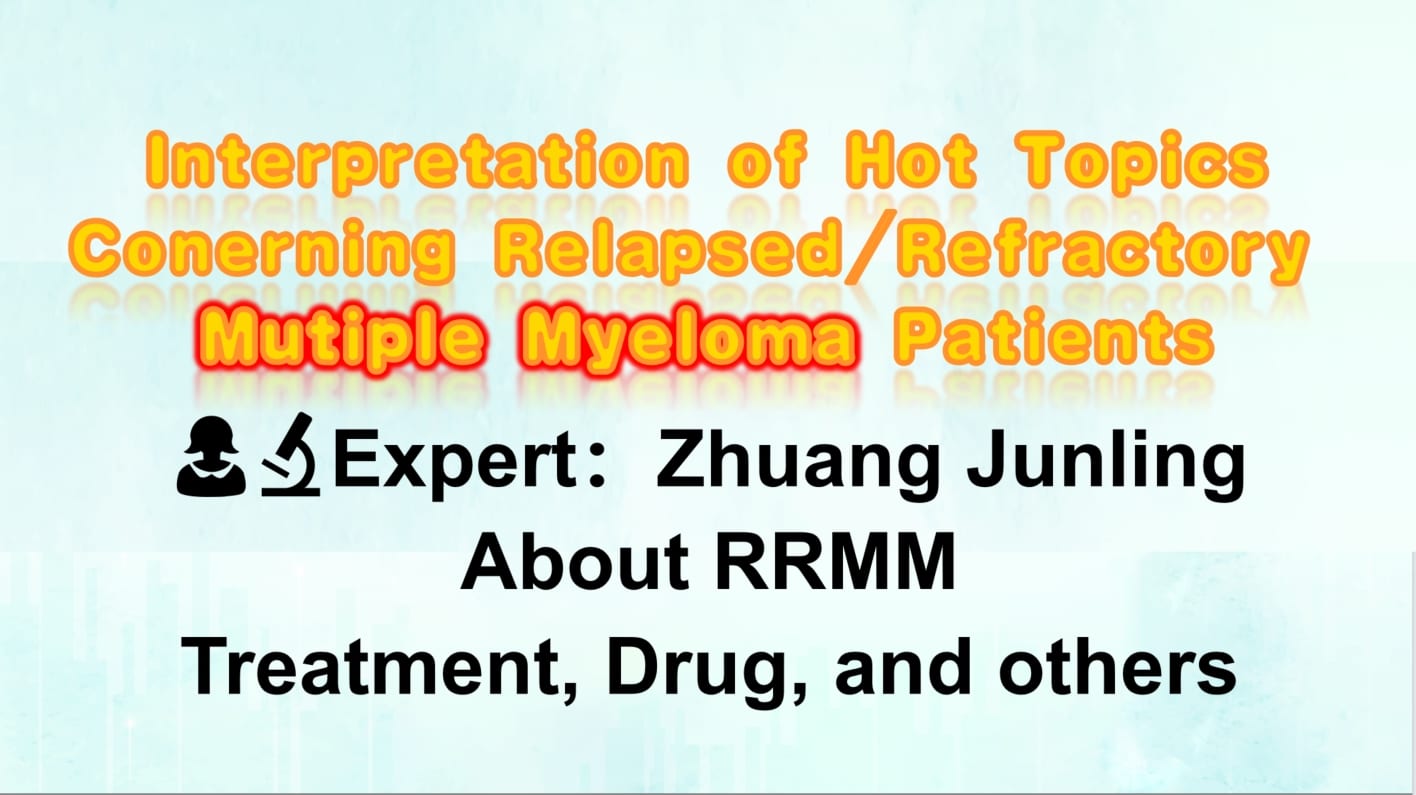
Interpretation of Hot Topics Conerning Relapsed/Refractory Mutiple Myeloma Patients
 Interpretation of Hot Topics Conerning Relapsed/Refractory Mutiple Myeloma Patients:
Interpretation of Hot Topics Conerning Relapsed/Refractory Mutiple Myeloma Patients:
What other treatment options are available for patients with relapsed Multiple Myeloma?
How effective is the new drug treatment for the first relapse of Multiple Myeloma?
What treatment options are available for initial relapse of multiple myeloma?
What are the treatment goals for Relapsed/Refractory Multiple Myeloma (RRMM)?
What treatment strategy should be adopted for RRMM in order to achieve maximum relief?
For Relapsed/Refractory Multiple Myeloma, what are the Grades of Response?
Expert Introduction
👩🔬Zhuang Junling
Associate Chief Physician Department of Hematology
Peking Union Medical College Hospital
Published over 50 papers in journals such as Blood, Leukemia Research, and others.
🎉🎉To assess whether the condition is suitable for CAR-T or clinic therapy, you can submit Advanced Medicine in China for preliminary evaluation!
WhatsApp: +8613717959070
Email: doctor.huang@globecancer.com
#CART #Mutiplemyeloma #CARTtherapy #myeloma #leukemia #drug #RRMM #cancer #cancersurvivor #cancerpatient #bloodcancer #tumor #cartcell #cartcelltherapy #cancertreatment #advancedmedicineinchina #hematology
Warning: Trying to access array offset on value of type bool in /www/wwwroot/www.medtourcn.com/wp-content/themes/medical-directory/framework/theme/medicaldirectory-image.php on line 78
Warning: Trying to access array offset on value of type bool in /www/wwwroot/www.medtourcn.com/wp-content/themes/medical-directory/framework/theme/medicaldirectory-image.php on line 79
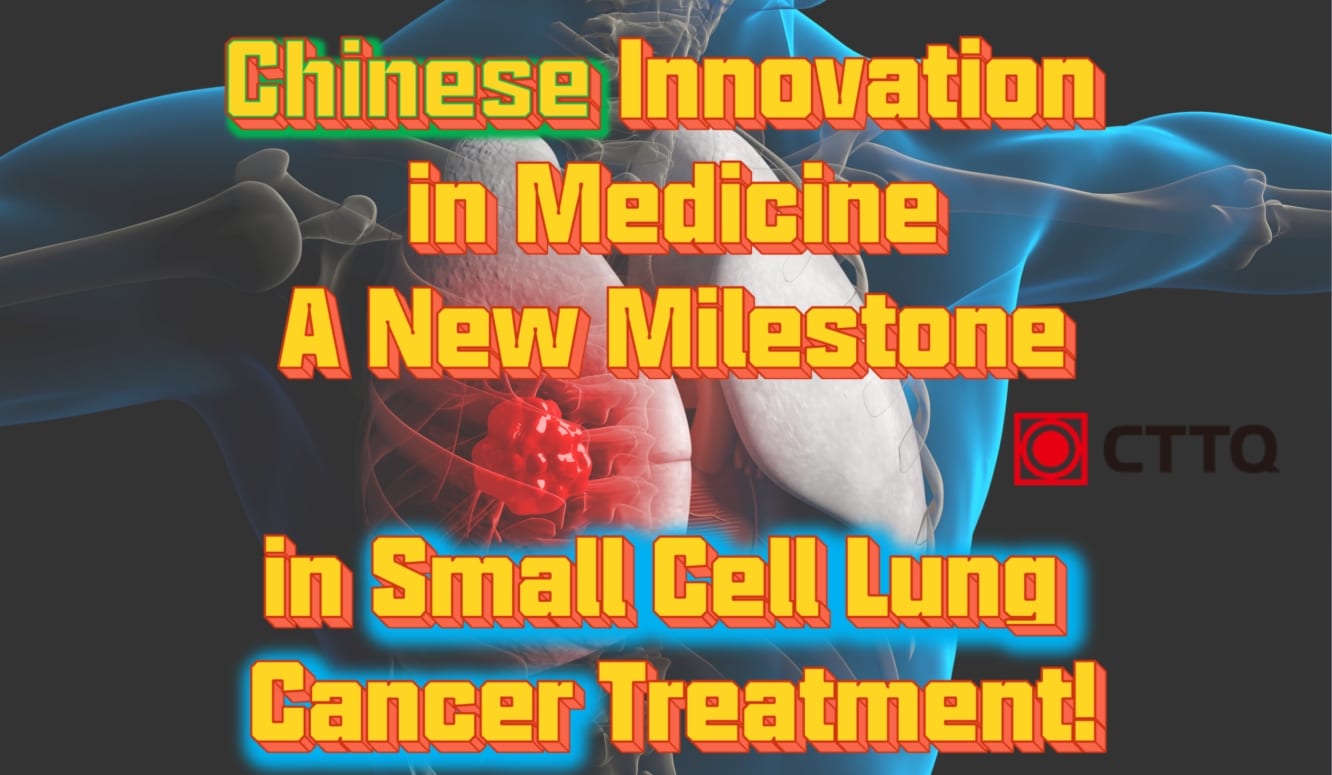
Chinese Innovation in Medicine: A New Milestone in Small Cell Lung Cancer Treatment!

 **Chinese Innovation in Medicine: A New Milestone in Small Cell Lung Cancer Treatment!**
**Chinese Innovation in Medicine: A New Milestone in Small Cell Lung Cancer Treatment!**


Small Cell Lung Cancer
In the field of medicine, each new drug represents a leap forward in disease treatment, bringing new light and hope to patients. On May 9, 2024, the highly anticipated novel PD-L1 inhibitor, Bevosubab Single Monoclonal Antibody, officially received approval from the National Medical Products Administration (#NMPA) of China! This marks a vibrant addition to the treatment options for patients with extensive-stage small cell lung cancer, adding a brilliant rainbow to the sky of treatment.
Bevosubab Single Monoclonal Antibody is a Class I innovative drug declared by the Chinese biopharmaceutical subsidiary, Sinda Pharmaceuticals, for first-line treatment of extensive-stage small cell lung cancer.
Bevosubab Single Monoclonal Antibody is extraordinary—it is a brand-new PD-L1 inhibitor that directly targets the immune escape mechanism of tumor cells, awakening the body’s immune system to eradicate cancer cells invisibly. Combined with Anlotinib Hydrochloride, Etoposide, and Carboplatin, it forms a powerful treatment alliance, bringing new hope to small cell lung cancer.
This is not just a treatment regimen, but a redemption. In the ETER701 study, this four-drug combination therapy has rewritten the history of first-line treatment for small cell lung cancer! Survival has nearly doubled, greatly increasing the chances of survival and bringing more hope to patients.
What’s even more exciting is that, while using the combination therapy, the occurrence of adverse reactions is extremely manageable. This means that while gaining a longer life span, patients do not have to overly worry about the potential negative impacts of treatment.
The approval of Bevosubab Single Monoclonal Antibody not only opens new treatment doors for patients with extensive-stage small cell lung cancer but also brings new directions for exploration in the medical field. We are full of anticipation and believe that this new drug will shine brightly in future clinical practice, bringing endless hope and vitality to more patients!
To assess whether the condition is suitable for new durg therapy, you can submit pathology reports, treatment history, and discharge summaries to the Medical Department of <#AdvancedMedicineinChina> for preliminary evaluation!
WhatsApp: +8613717959070
Email: doctor.huang@globecancer.com
#SmallCellLungCancerTreatment #BevosubabSingleMonoclonalAntibody #NewDrugApproval #MedicalBreakthrough #cancer #cancertreatment #lung #lungcancer
Warning: Trying to access array offset on value of type bool in /www/wwwroot/www.medtourcn.com/wp-content/themes/medical-directory/framework/theme/medicaldirectory-image.php on line 78
Warning: Trying to access array offset on value of type bool in /www/wwwroot/www.medtourcn.com/wp-content/themes/medical-directory/framework/theme/medicaldirectory-image.php on line 79

Introducing the Momentum of the Next-Generation “Pan-Cancer” Targeted Therapy ICP-723 of China
 Introducing the Momentum of the Next-Generation “Pan-Cancer” Targeted Therapy ICP-723 of China
Introducing the Momentum of the Next-Generation “Pan-Cancer” Targeted Therapy ICP-723 of China

Pan-Cancer
ICP-723
 On April 11, 2022, InnoCare Pharma unveiled the preclinical data of ICP-723. The research results demonstrate that ICP-723 effectively inhibits the kinase activity of TRKA, TRKB, and TRKC (IC50 value less than 1 nM). Not only does ICP-723 exhibit potent in vitro efficacy in TRK-driven tumors, but it also overcomes resistance mutations commonly seen after treatment with first-generation TRK inhibitors, such as TRKA G595R and TRKC G623R/E.
On April 11, 2022, InnoCare Pharma unveiled the preclinical data of ICP-723. The research results demonstrate that ICP-723 effectively inhibits the kinase activity of TRKA, TRKB, and TRKC (IC50 value less than 1 nM). Not only does ICP-723 exhibit potent in vitro efficacy in TRK-driven tumors, but it also overcomes resistance mutations commonly seen after treatment with first-generation TRK inhibitors, such as TRKA G595R and TRKC G623R/E.
TGI 89.5%
 Further in vivo efficacy studies have confirmed the robust anti-tumor effect of ICP-723 in animal models. At a dosage of 1 mg/kg, ICP-723 achieves a tumor growth inhibition rate (TGI) of 89.5% in the KM12 tumor model. With high oral bioavailability, ICP-723 demonstrates overall favorable pharmacokinetic parameters.
Further in vivo efficacy studies have confirmed the robust anti-tumor effect of ICP-723 in animal models. At a dosage of 1 mg/kg, ICP-723 achieves a tumor growth inhibition rate (TGI) of 89.5% in the KM12 tumor model. With high oral bioavailability, ICP-723 demonstrates overall favorable pharmacokinetic parameters.
Next-Generation NTRK Inhibitor
 ICP-723, a Chinese developed next-generation NTRK inhibitor, holds promise in treating advanced or metastatic solid tumors harboring NTRK fusion genes, including breast cancer, colorectal cancer, lung cancer, thyroid cancer, and patients resistant to first-generation NTRK inhibitors like larotrectinib and entrectinib.
ICP-723, a Chinese developed next-generation NTRK inhibitor, holds promise in treating advanced or metastatic solid tumors harboring NTRK fusion genes, including breast cancer, colorectal cancer, lung cancer, thyroid cancer, and patients resistant to first-generation NTRK inhibitors like larotrectinib and entrectinib.
 On August 31, 2021, InnoCare Pharma announced the Investigational New Drug (IND) approval from the U.S. Food and Drug Administration (FDA) to initiate Phase I clinical trials of its second-generation pan-TRK inhibitor ICP-723 in the United States.
On August 31, 2021, InnoCare Pharma announced the Investigational New Drug (IND) approval from the U.S. Food and Drug Administration (FDA) to initiate Phase I clinical trials of its second-generation pan-TRK inhibitor ICP-723 in the United States.
In the major financial performance report released by InnoCare Pharma in 2022, the efficacy of ICP-723 was also disclosed.
Objective Response Rate (ORR)
 As of February 11, 2022, in the Phase I dose-escalation trial, 17 patients received treatment with ICP-723 at doses ranging from 1 to 8 mg once daily. The safety profile was favorable, with no dose-limiting toxicities (DLT) observed. Among the 17 patients, 5 were confirmed positive for NTRK gene fusion, with an objective response rate (ORR) of 80%, including partial responses in 4 cases, and a disease control rate (DCR) of 100%. In the 4 mg and above dose group, the objective response rate was 100%.
As of February 11, 2022, in the Phase I dose-escalation trial, 17 patients received treatment with ICP-723 at doses ranging from 1 to 8 mg once daily. The safety profile was favorable, with no dose-limiting toxicities (DLT) observed. Among the 17 patients, 5 were confirmed positive for NTRK gene fusion, with an objective response rate (ORR) of 80%, including partial responses in 4 cases, and a disease control rate (DCR) of 100%. In the 4 mg and above dose group, the objective response rate was 100%.
 As a novel small molecule second-generation pan-TRK inhibitor, ICP-723 exhibits potent activity and high selectivity, offering the potential to overcome resistance to first-generation TRK inhibitors and better serve patients.
As a novel small molecule second-generation pan-TRK inhibitor, ICP-723 exhibits potent activity and high selectivity, offering the potential to overcome resistance to first-generation TRK inhibitors and better serve patients.
 (Note: This clinical trial is still recruiting participants. Patients who have undergone genetic testing can review their reports. Once NTRK1/2/3 fusion is detected, they can immediately contact us Advanced Medicine in China )
(Note: This clinical trial is still recruiting participants. Patients who have undergone genetic testing can review their reports. Once NTRK1/2/3 fusion is detected, they can immediately contact us Advanced Medicine in China )
 WhatsApp: +8613717959070
WhatsApp: +8613717959070
Email: doctor.huang@globecancer.com
Warning: Trying to access array offset on value of type bool in /www/wwwroot/www.medtourcn.com/wp-content/themes/medical-directory/framework/theme/medicaldirectory-image.php on line 78
Warning: Trying to access array offset on value of type bool in /www/wwwroot/www.medtourcn.com/wp-content/themes/medical-directory/framework/theme/medicaldirectory-image.php on line 79

Precision Treatment Journey: Defeating Multiple Myeloma with Chinese CAR-T Therapy
👑🍋Precision Treatment Journey: Defeating Multiple Myeloma with Chinese CAR-T Therapy👑🍋

Multiple Myeloma
💪Meet John, a resilient man from New Zealand who has been battling multiple myeloma, a relentless form of cancer. Severe bone pain has confined him to bed for an extended period, disrupting his daily life. However, a glimmer of hope emerged when he sought treatment at Renji Hospital’s Hematology Department in Shanghai, China.
🍒Renji Hospital’s medical team, led by Professor Hou Jian, specializes in CAR-T cell therapy, a revolutionary approach to target cancer cells with precision. John’s journey began eleven years ago when he was diagnosed with multiple myeloma. Despite undergoing numerous chemotherapy sessions and two autologous stem cell transplants, his condition deteriorated rapidly over the past year.
🍈Intense back pain rendered him unable to stand or walk, forcing him into prolonged bed rest and heavy reliance on pain medication. Further assessments revealed widespread extramedullary plasmacytomas in his bones and throat, along with complex chromosomal abnormalities, indicating a grim prognosis.
🍓Having exhausted conventional treatments, John explored alternative options and learned about Renji Hospital’s expertise in CAR-T cell therapy for refractory multiple myeloma. In 2016, Professor Hou Jian’s team initiated clinical trials utilizing CAR-T cell therapy, accumulating significant experience in treating relapsed and refractory cases.
🍇Upon evaluation, John’s medical team identified substantial tumor burden and compromised bone marrow function due to extensive chemotherapy. Despite the challenges, Professor Hou Jian’s team tailored a personalized treatment plan, opting for dual CAR-T therapy targeting CD19 and BCMA antigens.
🥑John has since returned to New Zealand and maintains regular contact with his medical team at Renji Hospital. Ongoing monitoring and follow-ups ensure his progress is closely tracked. “John is gradually reclaiming his daily life. Recently, he even shared photos of hiking and fishing adventures with us,” Professor Hou Jian shared.
🎉To assess whether the condition is suitable for CAR-T or clinic therapy, you can submit Advanced Medicine in China for preliminary evaluation!
Email: doctor.huang@globecancer.com,
WhatsApp: +8613717959070
#CARTtherapy #MultipleMyeloma #PrecisionTreatment #RenjiHospital #HopeInHealthcare #CART #cancer #cancertreatment #medicaltourism #tuomor #cartcell #CARTtherapy
Warning: Trying to access array offset on value of type bool in /www/wwwroot/www.medtourcn.com/wp-content/themes/medical-directory/framework/theme/medicaldirectory-image.php on line 78
Warning: Trying to access array offset on value of type bool in /www/wwwroot/www.medtourcn.com/wp-content/themes/medical-directory/framework/theme/medicaldirectory-image.php on line 79
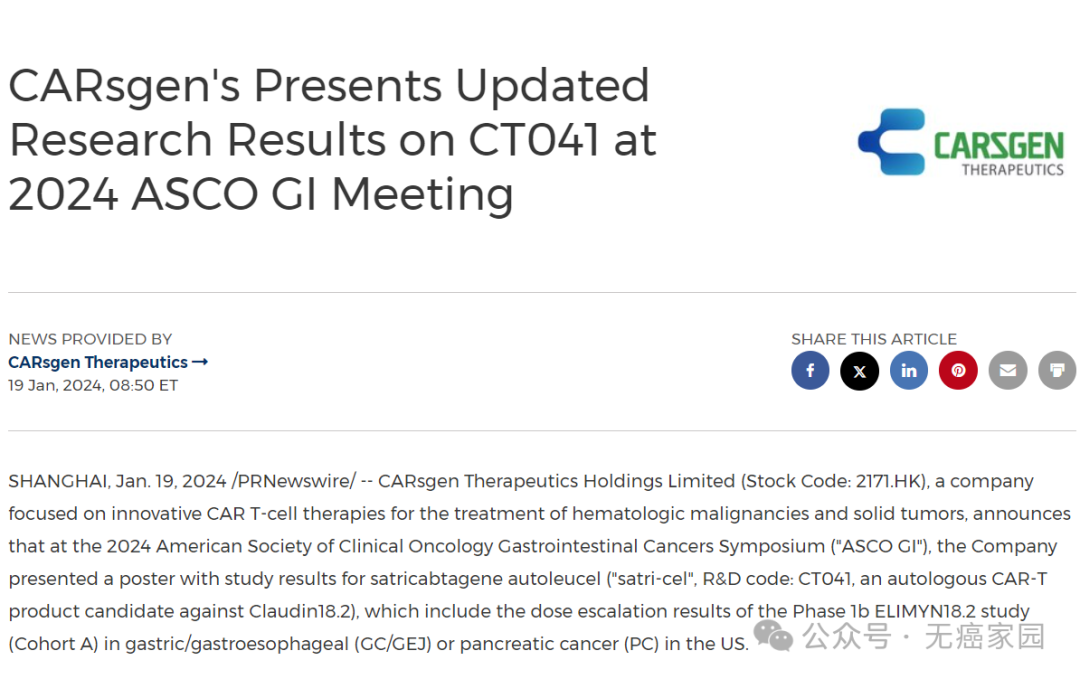
Breaking News: Another Milestone for Domestic CAR-T Therapy! Clinical Benefit Rate Reaches 71.4% in CT041 Trials, Challenging Gastric and Pancreatic Cancers with Astonishing Results!
🎉 Breaking News: Another Milestone for Domestic CAR-T Therapy! Clinical Benefit Rate Reaches 71.4% in CT041 Trials, Challenging Gastric and Pancreatic Cancers with Astonishing Results! 🚀

Gastric Cancer, Pancreatic Cancer
A burgeoning therapeutic target for gastric cancer—Claudin 18.2, its discovery has also opened a new chapter in targeted therapy for gastric cancer. If we talk about the hottest cell immunotherapy in recent years, it has to be chimeric antigen receptor T-cell (CAR-T) therapy. Based on this, Chinese researchers have developed the world’s first CAR-T cell therapy targeting Claudin18.2—CT041.
CT041, as the first CAR-T cell therapy targeting Claudin18.2, made its debut at the 2019 ASCO Annual Meeting. Among 12 patients with metastatic adenocarcinoma (7 gastric cancer, 5 pancreatic cancer) treated with Claudin18.2-targeting CAR T-cell therapy, no severe adverse events, treatment-related deaths, or serious neurotoxicity were reported. Among the 11 evaluated patients: 1 (gastric adenocarcinoma) achieved complete remission; 3 (2 gastric adenocarcinoma, 1 pancreatic adenocarcinoma) achieved partial remission; 5 had stable disease; and 2 experienced disease progression. The overall objective response rate was 33.3%.
At the 2024 American Society of Clinical Oncology Gastrointestinal Cancers Symposium (ASCO GI) held on January 19, 2024, SciGen showcased a clinical study of Claudin18.2-targeting autologous CAR-T cell therapy CT041 (satri-cel), reporting results from the dose escalation phase of the ELIMYN18.2 1b clinical trial conducted in the United States for the treatment of gastric/esophagogastric junction adenocarcinoma (GC/GEJ) or pancreatic cancer (PC).
This single-arm, open-label phase 1b/2 study primarily evaluated the safety and efficacy of CT041 in patients with advanced Claudin18.2-positive gastric/esophagogastric junction adenocarcinoma (GC/GEJ, progressing after at least second-line treatment or intolerant) or pancreatic cancer (PC, progressing after at least first-line treatment or intolerant).
Nineteen patients (9 GC/GEJ patients, 12 PC patients) received CT041 treatment at doses ranging from 250 to 600×106 cells: dose 1: 250-300×106 (n=6), dose 2: 375-400×106 (n=6), dose 3: 600×106 (n=7). All patients had received systemic therapy, with 85.7% of GC/GEJ patients and 58.3% of PC patients receiving ≥3 lines of systemic therapy. The median number of metastatic organs for all patients was 2, with at least one prior infusion. Clinical benefit rate included complete remission [CR], partial remission [PR], and stable disease [SD] ≥180 days.
As of September 15, 2023, with a median follow-up of 8.9 months, across all dose groups, the confirmed objective response rate (ORR) for gastric/esophagogastric junction adenocarcinoma patients was 42.9% (3/7); clinical benefit rate (CBR) was 57.1% (4/7); median progression-free survival (mPFS) and median duration of response (mDOR) were 5.7 months and 6.9 months, respectively. Additionally, the median overall survival (mOS) for gastric/esophagogastric junction adenocarcinoma or pancreatic cancer patients was 8.9 months. In dose level 3 (DL3), one gastric/esophagogastric junction adenocarcinoma patient achieved complete remission (CR). The clinical benefit rate for gastric/esophagogastric junction adenocarcinoma or pancreatic cancer patients was 71.4% (5/7), with a median OS of 12.9 months.
In summary, #CT041, as the first autologous #Claudin182 CAR-T cell therapy, demonstrates encouraging safety and shows promising preliminary efficacy in Claudin18.2-positive advanced GC/GEJ and PC patients who have received multiple prior treatments.
You can send electronic copies or photos of genetic testing reports and diagnostic reports to the email address: doctor.huang@globecancer.com, or click on the WhatsApp+8613717959070 icon on the homepage. The Medical Department will contact you as soon as they receive the reports.
🌟 #CART #Immunotherapy #CT041 #CancerResearch #ClinicalTrials #GastricCancer #PancreaticCancer #SciGen #ASCOGI2024
Warning: Trying to access array offset on value of type bool in /www/wwwroot/www.medtourcn.com/wp-content/themes/medical-directory/framework/theme/medicaldirectory-image.php on line 78
Warning: Trying to access array offset on value of type bool in /www/wwwroot/www.medtourcn.com/wp-content/themes/medical-directory/framework/theme/medicaldirectory-image.php on line 79

Introducing China’s Top 10 Leading Cancer Hospitals!
🏥✨ Introducing China’s Top 10 Leading Cancer Hospitals! 🏥✨

Top 10 Hospital
1. Cancer Hospital, Chinese Academy of Medical Sciences 🍏🍏
http://www.cicams.ac.cn/
Located in Beijing, a Grade A tertiary hospital, China’s first specialized cancer hospital. It serves as the National Clinical Medical Research Center for Malignant Tumors, the National Standardized Diagnosis and Treatment Center for Tumors, the National Drug Clinical Research Center, the National Clinical Research Quality Evaluation and Promotion Center, and the location of the National Anticancer Drug Monitoring Network.
2.Sun Yat-sen University Cancer Center🍎🍎
https://www.sysucc.org.cn
Sun Yat-sen University Cancer Center (SYSUCC) is one of the four earliest tumor hospitals in China. It is one of the affiliated hospitals of the prestigious Sun Yat-sen University. Located in the city of Guangzhou, SYSUCC is leading the way on a national frontier. It is the largest integrated cancer center in the whole of southern China for cancer . SYSUCC’s mission is to help people prevent and cure cancer.
3.Shanghai Cancer Center🍐🍐
https://www.shca.org.cn/
The Fudan University Shanghai Cancer Center (FUSCC), also called the Shanghai Cancer Hospital, is a teaching hospital affiliated with the Shanghai Medical College of Fudan University. Founded in 1931, it is the first cancer specialty hospital in China. It is rated Grade 3, Class A.
4.Peking University Cancer Hospital 🍊🍊
https://www.bjcancer.org/
Peking University Cancer Hospital (three other titles — Beijing Cancer Hospital, Beijing Institute for Cancer Research, and Peking University School of Oncology — refer to the same entity) ranks among the China’s top academic cancer centers。Peking University Cancer Hospital physicians provide patient-oriented medical services in a wide variety of cancer specialties treating gastric cancer, breast cancer, lung cancer, colorectal cancer, liver cancer, esophageal carcinoma, lymphoma, melanoma, and much more. Our team consists of a group of experts from different disciplines including oncology (cancer medicine), surgeons, radiology, and pathology.
5. Tianjin Medical University Cancer Institute & Hospital 🍋🍋
http://www.tjmuch.com/
Tianjin Medical University Cancer Institute & Hospital (TMUCIH) is one of the largest specialized hospitals in China with integrated patient care, education, training, research and preventative medicine. In 2013, TMUCIH was designated as National Clinical Research Center for Cancer by the Ministry of Science and Technology of The People’s Republic of China. In 2017, Oncology was selected as the National “World-Class” Academic Development Program in Tianjin Medical University by the Ministry of Education, the Ministry of Finance, and the National Development and Reform Commission.
The most recognized specialties in the hospital are basic and clinical research on breast cancer, lung cancer, esophageal cancer, liver cancer, head & neck cancer, biotherapy, molecular imaging, radiation oncology, medical oncology, pathology as well as epidemiology.
6. ShanDong Cancer Hospital 🍒🍒
http://www.sd-cancer.com/
Shandong First Medical University Affiliated Cancer Hospital, located in Jinan, is designated as a national clinical key specialty construction unit in oncology, a participant in the national project to enhance the diagnosis and treatment capabilities of difficult diseases, a national drug clinical trial institution, and the Chair of the Chinese Society of Clinical Oncology (a national first-level association). It serves as the Chairman Unit of the Radiotherapy Branch of the Chinese Medical Association, a clinical medicine center in Shandong Province, the Cancer Center of Shandong Province, the Tumor Quality Control Center of Shandong Province, the Anti-Cancer Association of Shandong Province, the Clinical Oncology Society of Shandong Province, and is affiliated with the Cancer Prevention and Control Office of Shandong Province.
7. West China Hospital🍉🍉
https://wcums.scu.edu.cn/
West China Hospital of Sichuan University is a national-level center for the diagnosis and treatment of difficult and critical illnesses in western China. It is also the world’s largest comprehensive single-point hospital and boasts the largest and earliest medical testing center in China to be accredited by the College of American Pathologists (CAP). It has been designated by the National Health Commission as one of the first pilot hospitals for multidisciplinary diagnosis and treatment of tumors.
8. Zhejiang Cancer Hospital 🍇🍇
https://www.zchospital.com/
Founded in October 1963, Zhejiang Cancer Hospital (ZJCH) is one of the earliest four cancer specialized hospitals in China to maintain the highest standards of excellence in patient care, cancer prevention, research, education and rehabilitation and is ranked among the Top 10 Best Cancer Hospitals of China for 8 consecutive years. The hospital is ranked third in cancer hospitals of China for performance assessment of national public hospital, which is first published in 2020.
9. Jiangsu Cancer Hospital🍓🍓
https://www.jszlyy.com.cn/
Jiangsu Cancer Hospital, located in Hangzhou, is a Grade A tertiary specialized hospital for oncology. It serves as a teaching center for cancer prevention, treatment, and research, as well as for scientific research and education in Jiangsu Province. It has been designated by the National Health Commission as one of the first pilot hospitals for multidisciplinary diagnosis and treatment of tumors.
Jiangsu Cancer Hospital is State Institution of Drug Clinical Trials, the first batch of National Standardized Training Base for Resident Physicians and Standardized Cancer Pain Treatment Demonstration Ward announced by the Ministry of Health, Guidance Hospital for Standardized Treatment of Malignant Tumors in Municipalities
10. Sichuan Cancer Hospital & Institute🍈🍈
https://www.sichuancancer.org/
Sichuan Cancer Hospital & Institute, Sichuan Cancer Center, Affiliate Cancer Hospital Of University Of Electronic Science and Technology of China (UESTC) ,Which is The Largest National Tertiary Level Class A Cancer Hospital In Southwest China for Cancer Prevention, Treatment, Rehabilitation, Research and Education, was Established in 1979 .
As A First Class Cancer Hospital In Southwest, Sichuan Cancer Hospital Has Characteristics and Advantages in the Comprehensive Treatment of Lung Cancer, Esophageal Cancer, Breast Cancer, Colorectal Cancer, Primary Liver Cancer, Malignant Lymphoma, Head And Neck Cancer, And Gynecological Cancer. Thriving from The Dominant Discipline Of Radiotherapy, Sichuan Cancer Hospital Has Built the Biggest Brachytherapy Center In Western China.
Stay tuned for more updates on China’s leading cancer hospitals!
🌸In addition to lung cancer, we are currently urgently recruiting patients with B-cell lymphoma, T-cell lymphoma, T-cell leukemia (T-ALL), acute lymphoblastic leukemia, myeloma, and other types of cancer!
🧶You can send electronic copies or photos of genetic testing reports and diagnostic reports to the email address:
🌈🌈📩doctor.huang@globecancer.com🌈🌈, or click on the ☎️WhatsApp+8613717959070☎️ .
The Medical Department will contact you as soon as they receive the reports.
#TopCancerHospitals #CancerCare #MedicalExcellence #chinesehospital #Tophospital #cancerhospital #top10hospital
